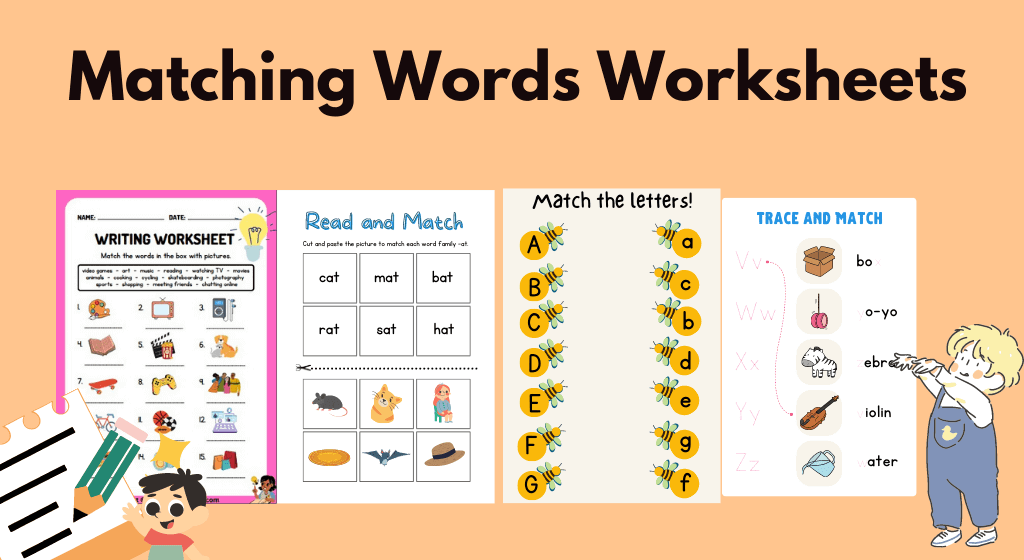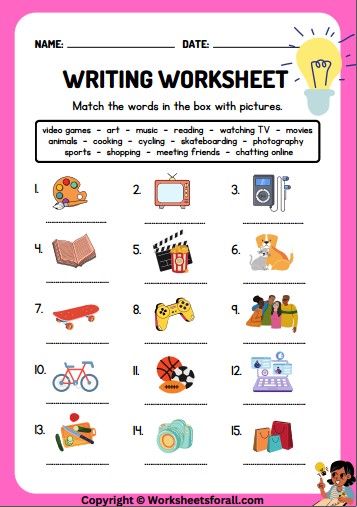Matching Words Worksheet: Proven Results, Guaranteed Engagement
Updated: March 14, 2023
568

This “Matching Words Worksheet” is designed to help individuals improve their language skills and vocabulary by providing a fun and engaging way to practice word association. The worksheet contains a series of exercises where readers are asked to match words with their corresponding definitions, synonyms, or antonyms. By playing this game, readers can strengthen their language knowledge, increase their vocabulary, and improve their overall language skills because matching worksheet kindergarten is considered the best tool to achieve guaranteed outcomes.
Free Matching Words Worksheets For Download
Matching Words Worksheet: What It Is and Why It Matters
Word matching is a language learning technique that involves connecting words to their definitions, synonyms, or antonyms. The goal is to develop stronger word associations and improve overall vocabulary knowledge. This technique is often used in language learning curriculums as a way to help learners develop their language skills.
The process of word matching requires critical thinking skills and a strong understanding of language structures. It can be an effective way to expand one’s vocabulary and improve reading comprehension. When individuals are able to recognize and understand the meaning of words quickly and accurately. It can significantly improve their ability to communicate effectively.
Word matching is also an engaging and fun way to learn new words and improve language skills. It can help learners stay motivated and interested in the language learning process, which is essential for long-term success. Additionally, word matching activities can be customized to suit learners of different levels. From beginner to advanced, making it a versatile tool for language teachers.
In conclusion, word matching is a valuable technique for language learners of all levels. It allows individuals to improve their language skills in a fun and engaging way. It helps in expanding their vocabulary and strengthening word associations. By incorporating word matching activities into language learning curriculums, learners can develop a deeper understanding of the language and improve their communication skills.
How to Play the Matching Words Worksheet Game: A Step-by-Step Guide
Playing the matching words game with the matching words worksheet is a great way to improve your language skills and vocabulary. Here is a step-by-step guide on how to play:
Step 1: Choose your word pairs. Select a set of words and their definitions, synonyms, or antonyms that you want to practice matching. You can create your own word pairs or find pre-made lists online.
Step 2: Shuffle the cards or scramble the words. Shuffle the cards or mix up the words to ensure that you are not memorizing the order of the words or definitions.
Step 3: Match the words. Start matching the words with their corresponding definitions, synonyms, or antonyms. You can play alone or with a partner.
Step 4: Check your answers. Once you have completed the matching. Check your answers to see how you did. If you made any mistakes, take note of them and try again.
Step 5: Repeat the game. Practice the game regularly to improve your word matching skills and expand your vocabulary.
Playing the matching words game is an effective way to strengthen language knowledge and improve overall language skills. By following these simple above-mentioned steps, you can start practicing word association and vocabulary building in a fun and engaging way. Picture word matching and Matching word worksheets are similar things. They both are very essential for preschool children and kindergarten children.
Tips for Improving Your Word Matching Skills: Strategies and Techniques
Here are some tips and strategies to improve your word matching skills and strengthen your language knowledge:
- Start with easy word pairs. Begin with simple word pairs and gradually work your way up to more difficult ones. This will help you build confidence and improve your accuracy.
- Focus on context. Pay attention to the context in which the words are used to better understand their meanings and how they are related.
- Use visualization techniques. Visualize the words and their definitions, synonyms, or antonyms in your mind to strengthen your word associations.
- Repeat the game. Play the matching words game regularly to reinforce your vocabulary knowledge and improve your word matching skills.
- Practice with a partner. Play the game with a partner to make it more interactive and challenging. This will help you improve your communication skills and learn from others.
- Use technology. There are many language learning apps and websites that offer word matching games and exercises to help you improve your skills.
By following these tips and strategies, you can enhance your word matching skills and build a stronger foundation for your language learning journey. Remember to be patient with yourself and to practice regularly to achieve the best results.
Common Challenges and How to Overcome Them: Troubleshooting Guide
While playing the matching words game can be a fun and effective way to improve your language skills, there may be some challenges that you encounter along the way. Here are some common challenges and tips for overcoming them:
- Difficulty with memorization: If you are having trouble remembering the words or their definitions, synonyms, or antonyms, try breaking them down into smaller chunks. Visualize them in your mind. You can also repeat the game multiple times to reinforce your memory.
- Limited vocabulary: If you are struggling to match words because you are not familiar with their meanings, try focusing on expanding your vocabulary through reading. Watch videos. Or by using language learning apps.
- Lack of motivation: If you are feeling demotivated, try setting goals and tracking your progress. You can also try playing the game with a friend or finding a language exchange partner to make it more fun and engaging.
- Difficulty with word associations: If you are struggling to connect the words with their definitions, synonyms, or antonyms, try creating a mental image or a story to help you remember the association.
- Confusion with similar words: If you are having trouble differentiating between similar words, such as synonyms or antonyms, try looking for context clues or using a dictionary to clarify the meaning.
By identifying and addressing these common challenges, you can overcome them and continue to improve your language skills through the matching words game. Remember to stay patient and consistent with your practice, and don’t be afraid to ask for help when needed.
Expand Your Vocabulary: Learn New Words and Definitions Through Word Matching
Expanding your vocabulary is a crucial part of language learning, and the matching words game can be an excellent tool for learning new words and definitions. Here are some ways to use the game to expand your vocabulary:
- Choose a new set of words and definitions: Select a set of words and definitions that you are not familiar with, and use the matching words game to practice associating them with each other.
- Play with a dictionary: If you come across a word that you don’t know, look it up in a dictionary and try to find its definition, synonyms, or antonyms. Then use the matching words game to practice matching the word with its definition or other related words.
- Use word lists: There are many pre-made word lists available online or in language learning textbooks. Choose a list that interests you and use the matching words game to practice associating the words with their definitions or related words.
- Play with a partner: Playing the matching words game with a language exchange partner or a friend can be a great way to learn new words and practice your communication skills.
By using the matching words game to expand your vocabulary, you can learn new words and definitions in a fun and interactive way. Remember to practice regularly and focus on words that are relevant to your language learning goals.

Please Write Your Comments